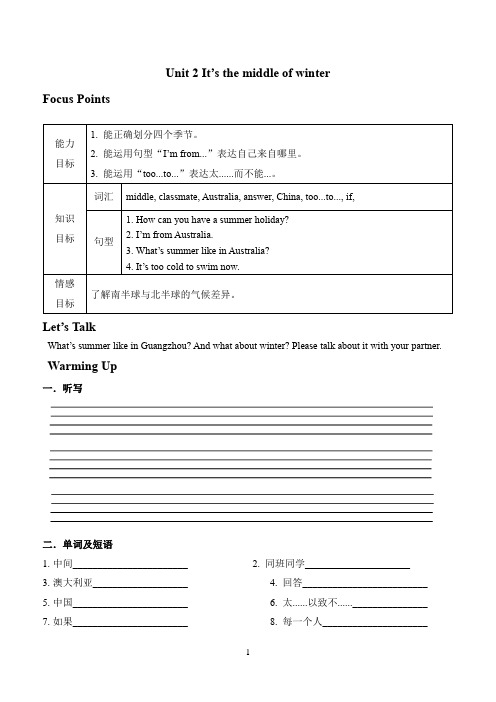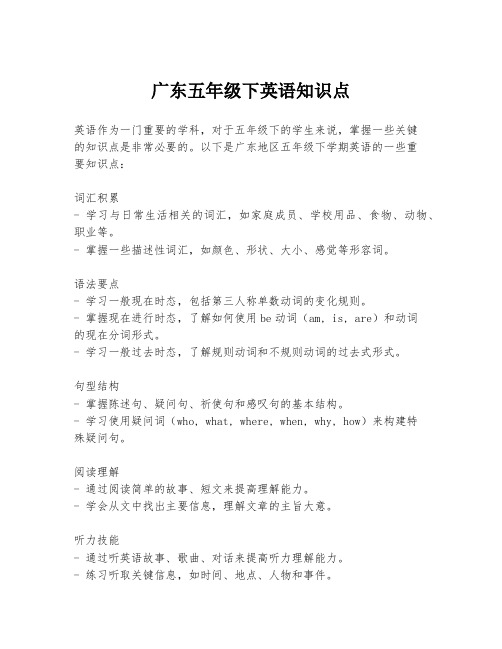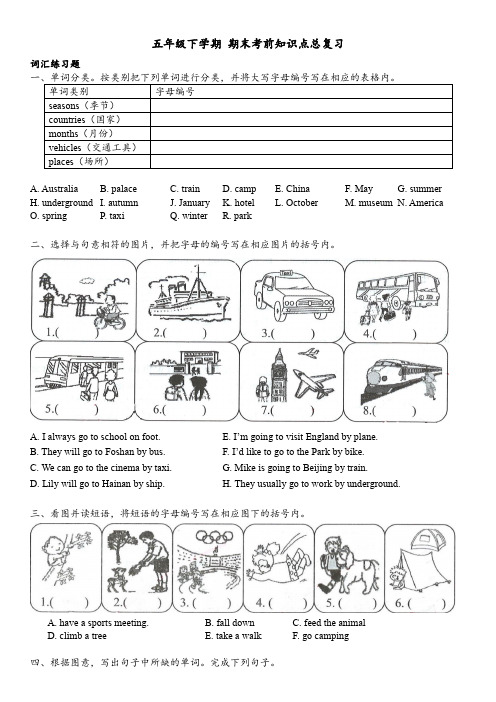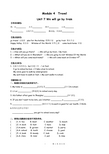广州版五年级英语下册重要考点归纳
广州版小学英语五年级下册:Unit 2 It’s the middle of winter

Unit 2 It’s the middle of winterFocus PointsLet’s TalkWhat’s summer like in Guangzhou? And what about winter? Please talk about it with your partner. Warming Up一.听写二.单词及短语1.中间_______________________2. 同班同学_____________________3.澳大利亚___________________4. 回答_________________________5.中国_______________________6. 太......以致不......_______________7.如果_______________________8. 每一个人_____________________9. 从......到......_________________10. 去游泳______________________ 三.课文内容根据提示把句子补充完整。
“Hi, everyone! ”said Ben to his __________,”This is my cousin Reg. He ______ _______(正在拜访)me for the summer holidays.”“I don’t understand,” said Xiaoling. ‘It is January now, _______ _______ _______ _______.How can you ________ a summer holiday?”“I’m from Australia,” answered Reg. “Our summer is from_________ to ________,so it is summer _______Australia now.” ”I see now,”said Jiamin. “When it is summer in Australia, it is _______in China.”“What’s summer like in Australia, Reg?” asked Xiaoling. “It’s very hot, so we always go swimming,” answered Reg. “It’s _______cold ______swim now,” said Ben.”But if you are here from ________to ________,we can go swimming every day.”Language Points【知识考点一】How can you have a summer holiday? 你怎么会有暑假?how意为“如何,怎样”,用于询问方式方法。
新版广州英语五年级下期末复习汇总.doc

五年级下学期期末考前知识点总复习词汇练习题一、单词分类。
按类别把下列单词进行分类,并将大写字母编号写在相应的表格内。
单词类别字母编号seasons (季节)countries (国 家)months (月份)vehicles (交通工具)places (场所)E. Pm going to visit England by plane.F. Fd like to go to the Park by bike.G. Mike is going to Beijing by train.H. They usually go to work by undergroundA. have a sports meeting. D. climb a treeA. AustraliaB. palace H. underground I. autumn 0. spring P. taxiC. trainJ. January Q. winterD. camp K. hotel R. parkE. China L. October E May M. museum G. summer N. America二、选择与句意相符的图片,并把字母的编号写在相应图片的括号内。
))6.() 7.() 8.()3.(4.A. I always go to school on foot.B. They will go to Foshan by bus.C. We can go to the cinema by taxi.D. Lily will go to Hainan by ship.三、看图并读短语,将短语的字母编号写在相应图下的括号內。
2.(B. fall downC. feed the animal E. take a walkF. go camping四、根据图意,写出句子中所缺的单词。
完成下列句子。
1. We p ___________ t o see a f ___________ i n the cinema tonight.2. Let's go to visit the G ____________ W ___________ this summer holiday.3. My grandpa often takes a w ____________ a fter suppe 匚4. The children will meet at the school g ___________ .5. There is a boat on the 1 ___________ •6. There are some buses at the s ___________ .7. Lily goes to the s ___________ every weekend. & We will stay in Shanghai H ____________ w hen we travel in Shanghai. 六、根据图片意思,填写所缺的字母,把下列句子补充完整。
广州版小学五年级英语知识点总结

广州版小学五年级英语知识点总结五年级上册共六个模块,18单元,209单词(四年级186个单词)五年级下册共六个模块,18单元,157单词(四年级172个单词)五年级上册知识点Module1 Routines and Dates学习重点1、掌握一月到十二月、四季的名称2、用英语说出日期日期的表示法有两种,如:“今天10月20日。
”a)先说月份:Today is October the twentieth (20th)b)先说日期:Today is the twentieth of October(20th)1、掌握节日的名称及日期。
(详见书本第13页)例如:New Year's Day( January 1st ) Women's Day( March 8th)4、能用英语说出学期的开始和结束The autumn term begins in September and ends in January.5. 掌握基数词和序数词,注意区分和运用重点掌握:first,second,third,fifth,ninth,twelfth,twentieth.基数词表示数量:three pandas三只熊猫。
序数词表示顺序:the second month第二个月6、注意表示时间频率的词:never、sometimes、often、usually、always,注意这些词在句子中的位置——除了“是”动词以外,他们都放在在动词的前面,如:(1)She often comes here . (2)She is always late .7、能用英语谈论日常的活动(能写一篇小作文)8、掌握时态:一般现在时的使用:(1)定义:一般现在时表示已形成习惯、规律的动作或状态。
(2)特征:通常句子中有often、usually、或sometimes等等。
(3)肯定句的结构:人称+动词:①其他人称(I、you、we、they、the boys……)+动词原形②第三人称单数(he、she、it、Tom、……)+动词“s/es”形式例句:The boys like TV plays. Sally likes TV plays.(4)一般疑问句:助动词(Do/Does)+人称+动词原形Do the boys like TV plays? Does the boy like TV plays?(5)否定句:人称+助动词否定形词(don’t/doesn’t)+动词原形The boys don’t like TV plays. The boy doesn’t like TV plays. (6)记住:助动词一出,后面动词用原形。
广东五年级下英语知识点

广东五年级下英语知识点英语作为一门重要的学科,对于五年级下的学生来说,掌握一些关键的知识点是非常必要的。
以下是广东地区五年级下学期英语的一些重要知识点:词汇积累- 学习与日常生活相关的词汇,如家庭成员、学校用品、食物、动物、职业等。
- 掌握一些描述性词汇,如颜色、形状、大小、感觉等形容词。
语法要点- 学习一般现在时态,包括第三人称单数动词的变化规则。
- 掌握现在进行时态,了解如何使用be动词(am, is, are)和动词的现在分词形式。
- 学习一般过去时态,了解规则动词和不规则动词的过去式形式。
句型结构- 掌握陈述句、疑问句、祈使句和感叹句的基本结构。
- 学习使用疑问词(who, what, where, when, why, how)来构建特殊疑问句。
阅读理解- 通过阅读简单的故事、短文来提高理解能力。
- 学会从文中找出主要信息,理解文章的主旨大意。
听力技能- 通过听英语故事、歌曲、对话来提高听力理解能力。
- 练习听取关键信息,如时间、地点、人物和事件。
口语表达- 练习日常对话,如问候、自我介绍、描述事物等。
- 学习使用礼貌用语,如请、谢谢、对不起等。
写作技巧- 练习写简单的句子和段落,如写日记、书信或描述性短文。
- 学会使用标点符号,如句号、问号和感叹号。
文化知识- 了解一些英语国家的文化习俗,如节日、饮食习惯等。
- 学习一些简单的英语谚语和习语,增加语言的趣味性。
复习与练习- 定期复习所学知识,通过做练习题来巩固学习成果。
- 参与小组讨论和角色扮演活动,提高语言运用能力。
通过系统地学习和练习,五年级的学生可以逐步提高英语水平,为将来的英语学习打下坚实的基础。
希望这些知识点能够帮助学生更好地掌握英语,享受学习英语的乐趣。
最新广州版重点小学英语五下重点短语和重点句子

五下重点短语和重点句子Module 1重点短语go skiing去滑雪plant flowers种花play outdoors在户外玩耍go camping去野营in the tree在树上make a snowman堆雪人fly a kite放风筝 a pair of一双;一副take a photo照相go swimming去游泳lots of许多too...to...太……以致不……重点句子1.What’s your favourite season? 你最喜欢什么季节?2.I don’t like summer and I don’t like winter, either.我不喜欢夏天,也不喜欢冬天。
3.My favourite season is autumn. 我最喜欢的季节是夏天。
4.When it snows, I can make a snowman. 下雪的时候,我可以堆雪人。
5.I’m from Australia. 我来自澳大利亚。
6.What’s summer like in Australia? 澳大利亚的夏天是什么样的?7.It’s too cold to swim. 太冷了,以致不能游泳.8.But if you are here from July to August, we can go swimming everyday.但是如果七月到八月你在这里,我们可以每天都去游泳。
重点短语visit the museum参观博物馆visit a farm参观农场have a good time过得愉快have a sports meeting开运动会go to the school open day参加学校开放日go shopping去购物go running去跑步go mountain climbing爬山go boating去划船go horse-riding去骑马take a walk散步play table tennis打乒乓球重点句子1.What’s the date today? 今天是几月几日?2.We are going to see a film tomorrow evening.明天晚上我们打算去看电影。
广州版小学英语五年级下册英语重点知识点习题全册

Unit 1 What’s your favourite season?--Look at all the colourful flowers and the beautiful birds in the trees.--I really love spring. What’s your favourite season,Ben?--Summer. I love swimming and summer is the best time for swimming.--Do you like summer, Jiamin?--I like swimming but I don’t like summer. It is too hot. I prefer winter.--When it snows, I can make a snowman.--I don’t like summer and I don’t like winter, either.My favourite season is autumn. It’s very windy and I can fly a kite.看看这些五彩缤纷的花朵和树上美丽的小鸟。
我真的很喜欢春天。
本,你最喜欢什么季节?夏天。
我喜欢游并且夏天是游泳的最佳时间。
你喜欢夏天吗,家明?我喜欢游泳,但不喜欢夏天。
它太热了。
我更喜欢冬天。
下雪的时候,我可以堆雪人。
我不喜欢夏天,也不喜欢冬天。
我最喜欢的季节是秋天。
风很大,我可以放风筝。
一、重点短语:go skiing 去滑雪plant flowers 种花play outdoor 在户外玩look at 看……in the tree 在树上really love 确实喜欢like swimming 喜欢游泳go skiing 去滑雪make a snowman 堆雪人fly a kite 放风筝二、重点句型:1. --What’s your favourite season?--My favourite season is summer.2. –What season do you like best?--I like spring best.三、重点分析:1. in the tree 和on the tree都可以表示“在树上”;in the tree表示外来的东西在树上;on the tree表示树本身的东西。
新版广州英语五年级下期末复习汇总

五年级下学期期末考前知识点总复习词汇练习题A. AustraliaB. palaceC. trainD. campE. ChinaF. MayG. summerH. undergroundI. autumnJ. JanuaryK. hotelL. OctoberM. museumN. AmericaO. springP. taxiQ. winterR. park二、选择与句意相符的图片,并把字母的编号写在相应图片的括号内。
A. I always go to school on foot. E. I’m going to visit England by plane.B. They will go to Foshan by bus. F. I’d like to go to the Park by bike.C. We can go to the cinema by taxi.G. Mike is going to Beijing by train.D. Lily will go to Hainan by ship.H. They usually go to work by underground.三、看图并读短语,将短语的字母编号写在相应图下的括号内。
A. have a sports meeting.B. fall downC. feed the animalD. climb a treeE. take a walkF. go camping四、根据图意,写出句子中所缺的单词。
完成下列句子。
1. Can you tell me the way to the __________, please?2. They plan to go the _____________ in the afternoon.3. It’s March 12th. It’s time to ___________ trees.4. The Webbs are going to have a three-day holiday on a __________5. Go straight ahead, and turn __________ at the ______________ crossing.五、根据图示情景以及首字母提示,填写所缺的单词。
【广州版】五年级英语下册 M4Travel复习要点与习题

Module 4 TravelUnit 7 We will go by train【单词回顾】:乘,由________ 火车________ 离开________ 山谷_______岛_________ 出租汽车__________ 激动地,兴奋的__________【重点短语】:go travel 去旅游plan for the holiday 假期计划go by train 乘火车去Happy Valley 欢乐谷Window of the World 世界之窗come back home 回家【重点句型】:1. ---How will you go there? ---We will go by train. / By train.2. ---What will you do in Shenzhen? ---We are going to visit Window Of the World.3. ---When will you come back home? ---We will come back on October 4th.【重点分析】:1. 交通方式的表达:by+交通工具/ on footI go to school by bus. = I take a bus to school.My uncle goes to walk by underground.My aunt hoes to walk on foot. = My aunt walks to school.【随堂练习】一、根据汉语意思完成英语句子。
1. My home is ____________(近的). I ________________(步行)to school.2. Li Lei ___________ (乘地铁) to school every day.3. His father often goes to Shanghai __________ _________(坐飞机).4. If you don't want to be late, you'd better _________ a ____________(打的).5. ________ ________ _______ (骑自行车) to work is good for our health, I think.6.你每天怎样去学校?_________ ________ you get to school every day?二、请找出划线部分读音不同的单词。
- 1、下载文档前请自行甄别文档内容的完整性,平台不提供额外的编辑、内容补充、找答案等附加服务。
- 2、"仅部分预览"的文档,不可在线预览部分如存在完整性等问题,可反馈申请退款(可完整预览的文档不适用该条件!)。
- 3、如文档侵犯您的权益,请联系客服反馈,我们会尽快为您处理(人工客服工作时间:9:00-18:30)。
五年级英语下册重要考点Unit 1. What’s your favourite season?1. in the tree(外来物在树上)on the tree (长在树上)2. the best time to + V原the best time for +V-ing/名词3. I don’t like summer, and I don’t like winter , either.too (用于肯定句)放句末“也”either (用于否定句)also -------------------- 放句中4. go skiing (去滑雪) go skating (去溜冰)5. prefer 更喜欢(用于两者之间做选择)6. --What’s your favourite season? 你最喜欢的季节是什么?答:My favourite season is +季节.Season(季节):spring(春), summer(夏), autumn(秋), winter(冬)Month(月份):January, February, March, April, May, June,July, August, September, October, November, DecemberUnit 2. It’s the middle of winter1. in the middle of…在…的中间/中期eg: The park is in the middle of the city. 这座公园在城市的中间。
2. say to sb. 对某人说3. He is visiting me for the summer holidays.for表示原因,由于在放假,所以来看我。
4. How do you have a summer holiday? (how表示怎么、怎样)5. I am from Astralia. ( be from = come from 来自)eg: I am from China. = I come from China.6. too…to …(+V原) 太…以致不能…eg: It’ s too cold to swim now.7. What’s summer like in Australia? 澳大利的夏天怎么样?(问天气) What ’s …like? …怎么样? 形容天气的形容词:hot, cold, warm, cool, wet, dry, windy, sunny, snowy, rainyUnit 3. We are going to have an English test 1. 问日期:--What ’s the date today? --It ’s +日期. 2. 问星期:-- What day is it today? --It ’s +星期. 3. 日期的表达:月份+the+序数词 June the 23rdthe +序数词+of+月份 the 23rd of June (写法:June 23rd) 4. 基数词变序数词 基数词 序数词 基数词 序数词 one first eleven eleventh two second twelve twelfth three third thirteen thirteenth four fourth fourteen fourteenth five fifth fifteen fifteenth six sixth sixteen sixteenth seven seventh twenty twentieth eight eighth twenty-one twenty-first nine ninth twenty-twotwenty-secondtententhtwenty-three twenty-third5. on+具体日期/星期(的早上、下午、晚上)Eg : on June 11th , on the morning of June 11th , on Monday, on Monday afternoon 6. Is there anything else important next month?Is there 问,there is 答。
Yes, there is. / No, there isn ’t. anything 用于否定、疑问句,something 用于肯定句。
anything /something+形容词 :一些…的东西 (something interesting 一些有趣基数词变序数词的口诀:基变序,有规律,词尾加上th一二三,单独记,八去t (eighth ), 九去e(ninth),f 来把ve 替(five--fifth), ty变成tie(twenty--twentieth), 若是遇到几十几,的东西)Unit 4. Have a good time in Hainan1. 一般将来时的结构: be going to +V原will +V原plan to +V原2. I am sure we will have a good time in Hainan.have a good time = have fun 玩得开心,过的愉快3. Next week we will travel in Hainan for five days.for+时间段:持续….4. go for a picnic= go on a picnic= have a picnic 去野餐5. can’t wait to +V原迫不及待…6. 固定搭配:at night (在夜晚) at noon (在中午)Unit 5. Would you like to go with us?1. Would you like to +V原..? (表示邀请) 你想不想…肯定回答:Yes, I’d like/ love to...否定回答:Sorry, I am busy./…2. plan to + V原计划…3. That sounds great? 听起来很棒!(that做主语看作是三单, sound要加s)sound为感官动词,后加形容词。
感官动词还有:look, smell, feel, taste。
4. at the school gate 在学校门口(at后面加小地点)如:at school, at the library, at home, at the school meeting room等等Unit 6. See you at the party1. would like to +V原想要…2. invite sb. to…邀请某人去…3. all+可数名词复数 : 全部的…(all her friends and classmates )4. on this special day 在这特殊的一天(on用于具体某一天)5. call me on+电话号码(me代词放中间)6. see you at the party 聚会上见7. 四大说说: speak, say, tell, talkspeak+语言 eg: speak englishsay +内容 eg: My mum says: “you should go to bed now”.tell sb. sth. 告诉某人某事 (讲故事:tell a story)talk talk about sth. 谈论某事talk with sb. 和…谈论某事Unit 7. We will go by train1. Do you have any plans for the holiday? 你假期有什么计划吗?any 用于疑问句,后面加可数名词复数。
plan for the holiday 假期计划2. go travelling =go on a trip 去旅游3. exciting 令人感到兴奋的,主语一般是物excited 感到兴奋的,主语一般是人4. -- How will you get there? (一般将来时)/ How do you usually go to school?-- By+交通工具/ on foot.介词短语(放句末)动词短语(放句中)on foot walk 步行by bus take a bus 乘巴士by bike ride a bike 骑自行车by underground take an underground 乘地铁 to+地点by taxi take a taxi 乘出租汽车by plane take a plane/fly 乘飞机eg: I go to school on foot.= I walk to school.5. --What will you do in Shenzhen?-- I will + V原6. --When will you come back home?-- On+日期Unit 8. Ben’s first trip to Beijing1. first trip to …第一次去…旅游2. go there on foot = walk there 走路去那里go there by underground= take an underground there 乘地铁去那里3. have dinner together 一起吃晚餐(together 是副词,修饰动词)4. drive to…开车去…5. take some photos 拍照6. take a walk around the lake 围绕着湖边散步7. in Wangfujing Street 在王府井大街Unit 9. Be careful1. It’s time to+ V原. 该是…的时候了。
It’s time for+ V-ing/名词.2. Cooking can be fun, but you must be careful.Cooking动名词作主语,如:Swimming is my favouite sport.must:必须,属于情态动词,否定形式:mustn’t(禁止)、needn’t(不需要)学过的情态动词: can, will, may, should , shall, must (情态动词+V原)3. 祈使句祈使句是用来表示命令,请求或者建议等意义的句子。
祈使句的主语you通常忽略。
祈使句肯定祈使句? 动词原形+其他 (Watch out. / Be careful! ) 否定祈使句? Don’t +动词原形开头+其他( Don’t run on the stairs.)Let型祈使句? Let +宾格+动词原形(Let me help you.)【注意:let + 宾格+ V原】4. safety first. 安全第一名词+序数词结构(钱财第二:money second 吃饭第一:eating first)Unit 10. How to stay safe1. how to +V原…? 怎样….? (How to stay safe?)2. without +V-ing/名词没有…without water 没有水 without doing the homework 没有做作业重点短语:cross the street 横过街道at the traffic lights 在交通灯区safety crossing 安全通道on the stairs 在楼梯上in trouble 遇到麻烦in the street 在大街上Unit 11. Can you tell me the way?1. Can you tell me they way to +地点? 你能告诉我去…的路吗?(问路用语)2. Is the hospital on your left or on the right? (选择疑问句,二选一作答)3. 指路用语:go straight ahead 直走turn left/right at the second crossing 在第二个路口左/右转on the left/right 在左/右边4. 学过的方位介词:in, on , under, near, beside, next to, in front of, behind, opposite, between等等Unit 12. I know a short cut1. be late for…迟到…Eg: Don’t be late for school. 上课别迟到。
